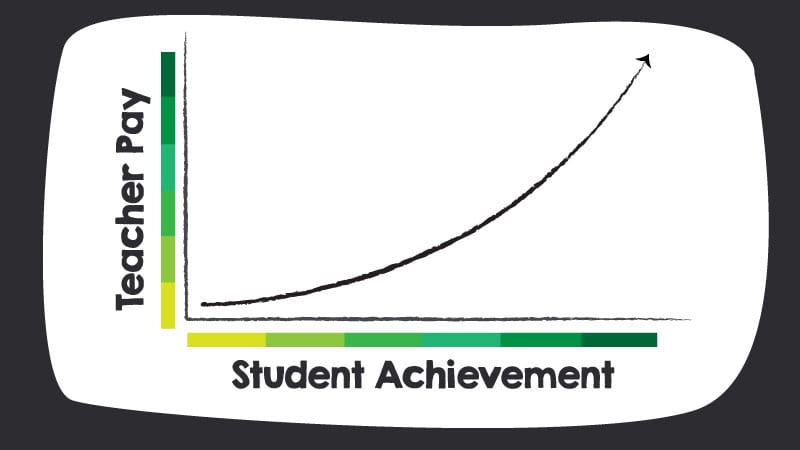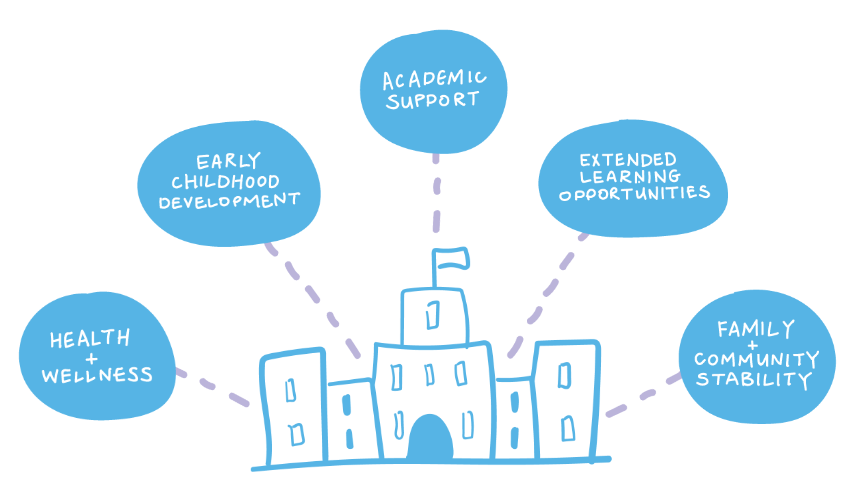State Senator Janice Bowling offers some thoughts on Early Childhood Education:
For more on education politics and policy in Tennessee, follow @TNEdReport
Your support — $5 or more today — makes publishing education news possible!
State Senator Janice Bowling offers some thoughts on Early Childhood Education:
For more on education politics and policy in Tennessee, follow @TNEdReport
Your support — $5 or more today — makes publishing education news possible!
Sure, it seems obvious that raising teacher pay makes a difference. But, it’s nice to have some evidence to back that claim up. Especially in a state where teachers now earn 4.4% less than they did back in 2009.
We Are Teachers has put together a list of six benefits of boosting teacher pay. Here are some highlights:
A majority (76%) of responders to a TIME poll said they agreed that many people won’t go into teaching because it doesn’t pay enough. This means fewer graduates of teacher education programs, and fewer teachers looking to fill the increase in demand for teachers.
Unsurprisingly, teacher pay has been shown to reduce turnover (which, in turn, increases student performance). Turnover is about 16% each year, and around 8% of teachers annually leave the profession entirely as opposed to moving to another school.
For example, a study in San Francisco found that when the salary for teaching was increased, the size and quality of teacher applicants increased.
Teachers are 30% more likely than non-teachers to have a second job. It goes without saying that raising teacher pay so teachers didn’t have to work a second job would boost teacher morale and help them stay focused on their classrooms.
In some states, teacher salaries are so low that teachers routinely qualify for public benefits like food stamps or public health care programs (like children’s health insurance programs). This is especially true for teachers who are the primary breadwinner in their family or have large families.
When teachers get paid more, students do better. In one study, a 10% increase in teacher pay was estimated to produce a 5 to 10% increase in student performance. Teacher pay also has long-term benefits for students. A 10% increase in per-pupil spending for each of the 12 years of education results in students completing more education, having 7% higher wages, and having a reduced rate of adult poverty. These benefits are even greater for families who are in poverty.

For more on education politics and policy in Tennessee, follow @TNEdReport
Your support — $5 or more today — makes publishing education news possible.

A note from Jeremy Mohler of In the Public Interest:
A groundbreaking new studyabout something you’ve likely never heard of might be the biggest education story so far this year.
For the past four years, Rand Corp. has studied New York City’s innovative Community Schools Initiative. It found that, in 113 public schools using the “community school” model, attendance improved, graduation rates increased, and more students passed courses and advanced grades on time.
What’s a community school, you ask? This video from the Learning Policy Institute goes a long way towards explaining. In short, they’re public schools that partner with local communities to create the conditions students need to thrive.
For example, students at the Bronx’s Benjamin Franklin School learn urban farming five days a week. A teacher helps them grow their own vegetables to eat for lunch and take home to their families.
These types of programs aren’t just a fancy New York City thing. Nationwide, there are more than 5,000 community schools.
Pocomoke High School on Maryland’s Eastern Shore pulls together families, home workers from social services, local agencies, and college representatives to build one-on-one relationships with students.
Martin Luther King Jr. Early College, a Denver high school, offers students mental health, dental, vision, and physician services.
The possibilities are almost endless, as long as the school is adequately funded—which is always the elephant in the room in education debates.
Decreasing taxes on corporations and the wealthy is slowly draining money from America’s public education system. The majority of states continue to spend less on education than they did ten years ago.
Fortunately, the growing #RedForEd movement has won not only higher teacher pay but also more funding for more school nurses, smaller class sizes, and more.
And in at least one case—the 2019 Los Angeles teachers’ strike—teachers were able to win promises from the local school district to transform 30 schools into community schools. This has cascaded into support from California Gov. Gavin Newsom, whose recent budget proposal calls for $300 million for community schools statewide.
A just-released poll shows that a majority of likely voters in the 2020 election view public schools positively but think they need more funding. If support for public education continues to grow, community schools might become the rarest thing in public policy: a silver bullet.

For more on education politics and policy in Tennessee, follow @TNEdReport
Your support — $5 or more today — makes publishing education news possible.

A North Carolina-based private school hungry for voucher dollars is headed to middle Tennessee, with a first stop in Franklin. Here’s more on the revelation that Thales Academy will open its first Tennessee school in Williamson County:
Thales Academy-Franklin will be the first school in Tennessee added to Thales Academy’s successful roster of eight current campuses in the Raleigh, North Carolina area. Founder Bob Luddy emphasized their methodology of direct instruction (DI) Tuesday night and expressed the passion in their mission of teaching to master and creating connections for their students.
TNEdReport has previously reported on Thales Academy, including the founder’s strong desire to have a school based in the Nashville area:
Roughly one month after Governor Bill Lee signed his Education Savings Account voucher scheme into law, a North Carolina-based private school announced it is expanding operations to Nashville. Perhaps not surprisingly, tuition at the school is similar to the amount available to families in Nashville and Memphis under the ESA program.
The school, Thales Academy, is operated by the CEO of a commercial kitchen ventilation company. Bob Luddy is also a top GOP donor in North Carolina.
Thales also held an informational meeting in Wilson County.
The announcement regarding the opening of the Franklin-based school lends credence to the warning that “pop-up” private schools will swoop into Tennessee to feast on voucher funds:
Those who warned that passage of vouchers would lead to “pop-up” private schools have already been proven right. Thales Academy and Bob Luddy were invited into Tennessee by Bill Lee and friends and are now perched like hungry vultures ready to suck funds from Nashville’s public schools.

For more on education politics and policy in Tennessee, follow @TNEdReport
Your support — $5 or more today — makes publishing education news possible.
Here’s some video of a House legislative committee hearing focused on how ClassWallet won a no-bid contract worth more than $1.2 million OVER what the legislature allocated:
MORE on ClassWallet and Vouchers in Tennessee:
For more on education politics and policy in Tennessee, follow @TNEdReport
Your support — $5 or more today — makes publishing education news possible.

Governor Bill Lee isn’t happy that members of his own party aren’t happy with the rocky rollout of the state’s voucher program, according to the Tennessean.
Gov. Bill Lee says the state should continue to move forward with implementing a school voucher program as quickly as possible, despite ongoing concerns being raised by legislators on both sides of the aisle.
Lee said Thursday the implementation of the program was being “hampered” by “detractors to a process,” and reiterated that he pushed for the program to “give kids in our state a high-quality education.”
Those “detractors” are worried about pesky little details like no-bid contracts and overspending.
It’s also worth noting that significant evidence indicates that vouchers don’t actually help kids, and in fact, can leave them lagging behind academically:
The first results came in late 2015. Researchers examined an Indiana voucher program that had quickly grown to serve tens of thousands of students under Mike Pence, then the state’s governor. “In mathematics,” they found, “voucher students who transfer to private schools experienced significant losses in achievement.” They also saw no improvement in reading.
The next results came a few months later, in February, when researchers published a major study of Louisiana’s voucher program. Students in the program were predominantly black and from low-income families, and they came from public schools that had received poor ratings from the state department of education, based on test scores. For private schools receiving more applicants than they could enroll, the law required that they admit students via lottery, which allowed the researchers to compare lottery winners with those who stayed in public school.
They found large negative results in both reading and math. Public elementary school students who started at the 50th percentile in math and then used a voucher to transfer to a private school dropped to the 26th percentile in a single year. Results were somewhat better in the second year, but were still well below the starting point.
In June, a third voucher study was released by the Thomas B. Fordham Institute, a conservative think tank and proponent of school choice. The study, which was financed by the pro-voucher Walton Family Foundation, focused on a large voucher program in Ohio. “Students who use vouchers to attend private schools have fared worse academically compared to their closely matched peers attending public schools,” the researchers found. Once again, results were worse in math.
It’s no wonder so many “detractors” are trying to “hamper the process.”

For more on education politics and policy in Tennessee, follow @TNEdReport
Your support — $5 or more today — makes publishing education news possible.

Lawmakers in Governor Bill Lee’s own party are expressing concern over the rushed rollout of the state’s school voucher program, according to a story at WPLN.
Legislators are worried that the Department of Education is rushing to get school vouchers started. The agency hired an outside vendor, Florida-based ClassWallet, to help with the rollout and to track education expenses.
“When they ask for $750,000 and then spend $2.5 million without telling us, those are real problems,” Hill said.
But House GOP Caucus Chairman Jeremy Faison told reporters he regrets supporting the law. He says the program isn’t being the run correctly, and although school vouchers are supposed to be implemented this year, Faison predicts that’s not going to happen.
While Republican lawmakers are questioning Lee’s Administration over the rapid rollout and no-bid contracts, Democrats have already called for a formal audit of how ClassWallet became the chosen vendor to administer vouchers.
It’s almost as if those who warned the voucher scheme would quickly get out of control were exactly right.

For more on education politics and policy in Tennessee, follow @TNEdReport
Your support — $5 or more today — makes publishing education news possible.

The Metro Nashville school board is calling on the State of Tennessee to step up when it comes to school funding, according to a story on WPLN.
Nashville leaders are calling on state lawmakers to increase education funding.
A resolution adopted by the Metro school board Tuesday night says the district needs more money to retain teachers.
District 9 school board member Amy Frogge, who proposed the resolution, says the state has over $5 billion in reserves that could be used for education funding.
Last week, board members expressed their support for a Metro lawsuit challenging the state’s new school voucher law — which they say will take money from the district.
“It’s critically important that we get that money to our schools,” says Frogge. “As a school board member but also as a parent, the needs in our schools are great and we’re losing teachers.”
While Governor Bill Lee’s proposed budget makes some investment in teacher pay, Tennessee teachers are still paid at a rate lower than they were in 2009, according to a report from the Sycamore Institute.
After adjusting for inflation, however, teachers’ average pay during the 2018-2019 school year was still about 4.4% lower than a decade earlier.
And, of course there’s the reality that the state grossly underfunds its school funding formula, the BEP.
In Tennessee, classroom size requirements have forced districts to hire more than 9,000 teachers beyond what the BEP provides to pay for their salaries, according to a statewide analysis presented by the Department of Education in December to the BEP Review Committee.
To address the BEP shortfall, the state needs at least $468 million. To address stagnant teacher pay, the state needs another $300 million. As Frogge notes, Tennessee has the money. Will our policymakers make a nearly $800 million investment in public schools?

For more on education politics and policy in Tennessee, follow @TNEdReport
Your support – $5 or more today – makes publishing education news possible.

Rep. Bo Mitchell of Nashville is asking for a formal investigation into how a contract to manage the state’s voucher program was awarded to ClassWallet, according to a story in Chalkbeat.
A Nashville lawmaker wants Tennessee’s chief internal investigator to look into how the Department of Education is paying for the early rollout of Gov. Bill Lee’s education savings account program.
The Republican governor ordered the early rollout last summer but set aside only $771,300 for voucher work in the 2019-20 budget approved last spring. The education department has since signed a two-year contract for $2.5 million with ClassWallet, a Florida-based vendor hired to manage online accounts and applications for the voucher program.
The education department irked many lawmakers when it signed the ClassWallet contract last fall without going through competitive bids or the legislature’s Fiscal Review Committee.
Mitchell’s push for an investigation follows concerns over how the contract was awarded to ClassWallet:
The lack of adherence to bidding procedures should come as no surprise as Commissioner of Education Penny Schwinn faced similar challenges when she held a senior level position in the Texas Education Agency.

For more on education politics and policy in Tennessee, follow @TNEdReport
Your support — $5 or more today — makes publishing education news possible.

I reported previously on the controversy surrounding ClassWallet and their contract to manage the voucher program in Tennessee. This week, members of a key legislative committee questioned Commissioner of Education Penny Schwinn about the issue. Here’s more:
For more on education politics and policy in Tennessee, follow @TNEdReport
Your support — $5 or more today — makes publishing education news possible.
